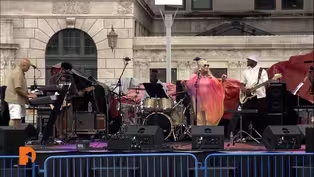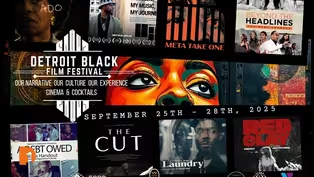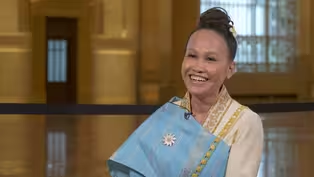
Residents in Southwest Detroit preserve community’s past through oral history project
Clip: Season 10 Episode 13 | 8m 22sVideo has Closed Captions
One Detroit looks at how the VOCES project has been collecting oral histories from natives of Southw
As part of our “Destination Detroit” series and in honor of National Hispanic Heritage Month, we’re featuring people who have made Southwest Detroit their home. One Detroit’s Bill Kubota reports on how residents are working to preserve the community’s history by documenting stories of people who grew up there. Their oral history project is called VOCES, which is Spanish for voices.
Problems playing video? | Closed Captioning Feedback
Problems playing video? | Closed Captioning Feedback
One Detroit is a local public television program presented by Detroit PBS

Residents in Southwest Detroit preserve community’s past through oral history project
Clip: Season 10 Episode 13 | 8m 22sVideo has Closed Captions
As part of our “Destination Detroit” series and in honor of National Hispanic Heritage Month, we’re featuring people who have made Southwest Detroit their home. One Detroit’s Bill Kubota reports on how residents are working to preserve the community’s history by documenting stories of people who grew up there. Their oral history project is called VOCES, which is Spanish for voices.
Problems playing video? | Closed Captioning Feedback
How to Watch One Detroit
One Detroit is available to stream on pbs.org and the free PBS App, available on iPhone, Apple TV, Android TV, Android smartphones, Amazon Fire TV, Amazon Fire Tablet, Roku, Samsung Smart TV, and Vizio.
Providing Support for PBS.org
Learn Moreabout PBS online sponsorship(gentle music) - [Bill] Corktown, Michigan Central beautified an attraction once again.
Lest we forget the people who've been part of this area decades past, like the Latino families who made their destination Southwest Detroit.
- So we have been here for a very long time, but yet our history has never been documented in the way that other communities have documented their history.
The African-American community proudly has documented their community, and that's a huge part of Detroit.
The Arab-American community has documented their history, - [Bill] This gathering.
Hosted by the Voces Oral History Project last December.
Voces, that Spanish for voices.
- The comprehensive collection of these stories has yet to be done.
And this committee came together to invite you here tonight because that's what we're gonna do.
(audience applauding) - You know, this neighborhood has been revitalized many times over by new families coming in.
There are new transplants you can call them.
They come in, they don't know any of this, and I think they'll be more than interested, everyone across the board, to learn about us and our stories.
- We have to tell our own story.
That's why I'm really proud of the work that the Voces Committee is interested in doing.
- [Bill] Filmmaker Len Radjewski Fraga used some audio recordings from the 1970s helping document his family's migration from Mexico to Michigan.
- [Speaker] And I thought he told me if I wanna go to Michoacan.
They ask me, "Do you want to go to Michigan?"
I said, "I don't know where I go."
- If my uncles could do it with reel to reel recorders, I mean, all of you should be doing.
The power of these things compared to an audio tape reel to reel and those early cameras.
- [Bill] Seems oral histories are a priority for those deemed to be more important, prominent people, but everyone has a story, right?
Technology like smartphone makes it easier to get them.
- But the first thing is, as you've heard many, many times, we all know, you gotta do a novel.
(upbeat music) - [Bill] Now, an imperative, when people die, histories can die too.
- We were motivated in a way to form this group, Voces, because of the work of one of the musicians, Cesar Pena, who said "I need to make a documentary about all these fantastic musicians that came out of Southwest Detroit and Del Ray."
But unfortunately, he passed away.
- [Bill] Back when Caesar Pena toured with famed bluesman Albert King.
Pena died in 2022.
Meanwhile, Aaron Barndollar and Ozzie Rivera had already been posting interviews done years ago on YouTube.
Musicians like Frank Panchito Lozano who'd been performing since the 1940s.
- This must be you here, Panchito, in the background.
- I'm right there.
- [Bill] Lozano, horn player, band leader, and the first Mexican American principal at a Detroit public school, died in 2014.
There were other musicians to interview, some they didn't get to in time.
- They played everything, especially, you know, during the war years there was a lot of big band, depended on where you were playing or who you were playing with.
- With the Voces project, they've expanded their scope into other aspects of life and culture in Southwest in the areas that have evolved into what's often called Mexican Town.
- Mexican Town, actually the label that we now use for Mexican Town was a marketing decision that was done in the mid '80s.
To kind of build on the fact there was a Detroit Greek Town restaurant district.
There was a strong restaurant district here back in my twenties, and definitely my teens, we would call the neighborhood (speaking Spanish) The neighborhood.
- [Bill] Rivera, almost 72 years old, born in Puerto Rico, at five months old, he and his mother joined his father in Corktown.
Barndollar, age 47, his family's home was nearby.
- My family lived on Beach Street, which would be where the MGM parking structure is right now.
- [Bill] Barndollar's family photo collection, a trove of memories.
He wants others to bring out their pictures too to add to the Voces collection.
- You know,now that generations, you know, boomers are getting older, folks are inheriting their family photos and are not sure what to do with them or kind of think they're worthless.
They're actually really invaluable.
- [Bill] Last summer, Barndollar started recording more oral histories, including his uncle, Henry Ibarra, and Henry's childhood friends, brothers Paul and Vic Venegas.
Ibarra's father came to Detroit from Michigan's Thumb.
- My grandfather had a farm and my dad did not like working on the farm.
So he left the farm in Capac and he come to Detroit and he got a job dishwashing, and he started out as a dishwasher and worked his way up to be the head chef of the Port Shelby Hotel.
- He was the Mexican Gordon Ramsay.
Never went to culinary school, but he could do anything in the kitchen.
- He knew everybody.
- [Bill] As Vic Venegas tells it, his father, Moses Venegas, started his first business in the early 1940s, - An American dream.
He won $500 at a crap game.
He told my mother, "I'm gonna rent the gas station."
He was 18 years old.
- During the day, he'd be pumping gas and all that.
And at night, out came the grill, and out came the long lounge chairs, and out came some food and drink, and a lot of the family would come over there.
They'd stop for gas.
But they stayed for a long, a long time.
- Stayed for dinner just about every night.
- [Bill] More oral histories are coming in.
Filmmaker Maurizio Dominguez got his start making documentaries.
With voces, he's doing research while editing an interview with Catholic activist Beatriz Escobel Ramos and Deacon Raul Feliciano of the Detroit Archdiocese.
- The people had that church built, the people built that little chapel.
- [Bill] They're talking about the Our Lady of Guadalupe Church of Southwest Detroit that dates back to the early 1920s.
- Yeah, the first Mexican national parish in the Midwest.
So not just Michigan, just Midwest overall.
This was all news to me.
And of course, the more that we start digging into it, I feel like the more curious I become and the more I wanna learn about this.
- Those people set for a priest in Mexico, because there were no Spanish speaking priests.
- I think that just speaks to the core of why it's so important to do this project.
You know, because stories like this, that if there's no documentation available and if there's no way for people to find out about it, then how are they gonna know, right?
What we're trying to avoid is having our history, the history of Latinos and our neighbors as well.
We're trying to prevent that from being lost.
- [Bill] Around 10 oral histories have been collected with that many more planned over the next 10 months.
Voces has some funding and is raising more to keep the ball rolling.
- I'm only one guy.
I can only record, edit so much.
So we're officially planning, you know, what's it gonna look like to expand, to grow this team and to bring more people from the community who can help with the archiving, the recording, the interviewing, everything.
- We're just scratching the surface.
This Latino community has been here since 1918.
- It's a huge undertaking.
But you know, we've assembled a great group of folks with a lot of talent and passion and expertise, and I think we're well on our way to telling the story.
Indian singer Asha Puthli performs in this year’s Concert of Colors
Video has Closed Captions
Clip: S10 Ep13 | 3m 4s | Detroit PBS’ “Best of Concert of Colors” features India-born singer songwriter Asha Puthli. (3m 4s)
A look at this year’s Detroit Black Film Festival
Video has Closed Captions
Clip: S10 Ep13 | 7m 12s | The sixth annual Detroit Black Film Festival showcases African American films from around the world. (7m 12s)
Ny Derry shares her journey from Laos to Michigan
Video has Closed Captions
Clip: S10 Ep13 | 3m 21s | Ny Derry from Livonia participates in One Detroit’s “Destination Detroit” series. (3m 21s)
Providing Support for PBS.org
Learn Moreabout PBS online sponsorship
- News and Public Affairs

Top journalists deliver compelling original analysis of the hour's headlines.

- News and Public Affairs

FRONTLINE is investigative journalism that questions, explains and changes our world.












Support for PBS provided by:
One Detroit is a local public television program presented by Detroit PBS


